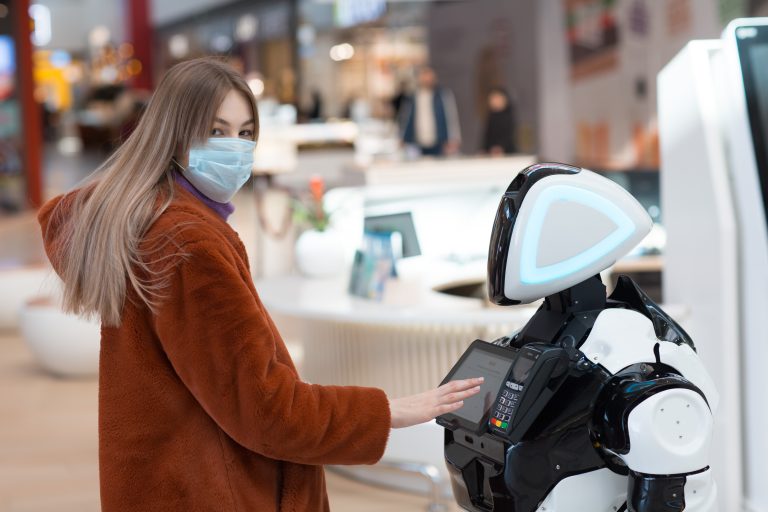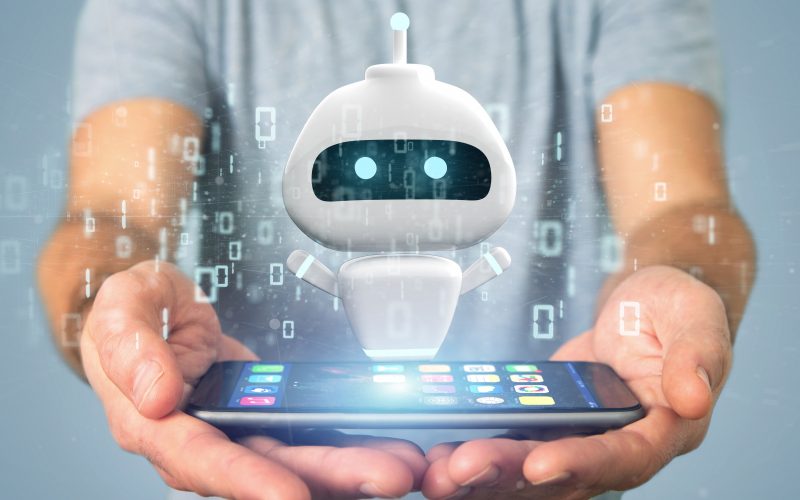
Categories
Automation supports performance during Covid-19

COVID-19 is disrupting life around the globe. Businesses of all sizes are facing an array of new and unanticipated challenges in maintaining productivity, supporting workers, and staying connected with customers and clients. As social distancing and other measures disrupt daily routines around the world, leaders in all areas of commerce and industry are turning to AI-powered automation systems to safely deliver goods and services during the pandemic.
COVID-19 challenges current contingency plan
The COVID-19 pandemic affects not only people, but also businesses of all sizes and industries. In hard-hit areas, stores and businesses deemed “non-essential” are shut down or forced to alter normal operations to protect both employees and the customers they serve. Whenever possible, employees are working remotely. Supply chains and production facilities that operate in a global commercial ecosystem are breaking down.

Business contingency plans typically include preparations for disasters such as fires, earthquakes, and hurricanes—natural disasters with outcomes that are relatively predictable. A pandemic such as COVID-19 is often considered a “high- impact” event, so standard emergency planning may not be able to adapt to the unique challenges that it poses.
To survive and thrive in the current crisis, businesses need new ways to stay connected, safe, and productive. Fortunately, the tools of digital process automation can help companies of all sizes implement new ways to keep employees safe and customers satisfied.
Automation supports remote work
As COVID-19 continues to spread, many businesses are taking unprecedented steps to protect workers from exposure to the virus. Some are redefining the workplace entirely by asking employees to work remotely, indefinitely, whenever possible. Industries forced to cope with worker absences are relying on automation to keep production lines moving, and customer-centered businesses are seeking ways to deliver goods and perform services while limiting worker contact with large numbers of people.
In these and other circumstances, cloud-based platforms and advanced machine learning can help companies remain productive while protecting both workers and the public. Automated systems for managing routine tasks like billing and payments can keep daily tasks on track while workers are unavailable. Cloud-based data management systems and productivity apps allow homebound workers to keep up with projects and collaborate with others in real time, while messaging apps, chatbots, and other communication tools allow workers to stay connected with customers and clients.
Automation supports productivity

Along with client- and customer-centered businesses, manufacturing and other industries also face massive changes due to COVID-19. Automation can help keep them running, too. Automating routine production line tasks not only compensates for absent workers, but it also keeps workplaces safer and maintains high-quality standards.
Cloud platforms and productivity tools allow company leaders to keep connected to partners, vendors, and distributors from any location at any time. In enterprises of all kinds, automating routine daily tasks frees staff for more complex work and avoids interruptions in supply chains, as well as transactions with customers and clients.
Automation supports relationships

As businesses struggle to stay afloat while buildings close and employees work from home, maintaining connections to clients, customers, and others in the company network is an essential survival strategy. AI-powered automation systems help to keep a corporate community protected while still continuing to produce and deliver the goods and products that people need.

Along with automating mundane tasks like billing and payment processing, digital systems can integrate a variety of tools to keep information flowing, address the concerns of clients and customers, and support the company’s reputation for reliability and authority. Chatbots powered by advanced machine learning can respond to customers at any time, and when more complex problems arise, staff working remotely can respond instantly via cloud-based messaging tools. Businesses can also use automated systems to keep customers updated on evolving circumstances, new offerings, and specials; they can also draw on the insights of AI-driven analytics to personalize messaging and offers.
Concerns about the spread of COVID-19 are driving a boom in online ordering and delivery options. Automation in these sectors makes it possible to process and fulfill these orders far more efficiently than standard manual systems. With systems in place for automatically handling payments, shipping details, and recurring orders, businesses that sell directly to consumers can help both workers and customers maintain the social distancing that contains the virus.
The rapid spread of COVID-19 is transforming the way the world does business. To keep up, companies must find new ways to stay accessible. Innovative digital systems supported by advanced machine learning have the tools that businesses need to attain this accessibility, as well as to stay productive and keep workers safe.